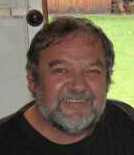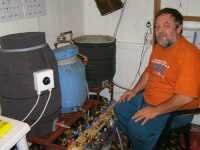
Tuesday, July 10, 2007
The Hop Farms around George

Western Cape Breweries and Brew Pubs Part 2
 Both the ship after which the brewery is named and the brewery itself are interesting, however these details can be found on the brochure (which is included below - click on the image to get a full size view) or on the brewery's website (see the link above).
Both the ship after which the brewery is named and the brewery itself are interesting, however these details can be found on the brochure (which is included below - click on the image to get a full size view) or on the brewery's website (see the link above). 

Anyway enough of the history lessons and on to the tour and the tasting. At the entrance to the restaurant and shop stand the mash tun and kettle behind glass doors. They are both lovely shiny copper and brass and the kettle has a capacity of about 2000 litres. From the kettle the wort is pumped to the primary fermenters where the temperature is controlled by means of glycol. From the fermenters the beer is then pumped into maturation tanks and finally to storage tanks prior to bottling or kegging. The beer is all filtered and pasteurised (the only exception being the honey blond wheat beer, which is a live unfiltered and unp ateurised beer.
ateurised beer.
The price fot tasting was R10 for 6 100 ml tasters and as I was driving 6 500ml glasses seemed out of the question. The six beers together with my comments were :-
Premium Lager - Very pleasant but a bit sweet for my palate.
Lite Lager - More bitter and hoppy than the premium lager, more to my taste.
Old English Bitter - Very Pleasant !
Honey Blonde - See my comments on previous post from Paulaner on wheat beer !!!
Red Reloaded Lager - Not an energy drink, not a beer uugh.
Chocalate Malt Stout - Very Pleasant and we had the right weather for it (cold and windy !)
All in all a most enjoyable and interesting detour from our planned route. Well worth a visit.
Monday, July 9, 2007
Western Cape Breweries and Brew Pubs Part 1
 day and so it had to fit in with what the rest of the family were doing). I managed the Paulaner Brewpub on the Cape Town waterfront, which happened to be right next to where we got off the boat after a trip to the infamous Robben Island (where Nelson Mandela was held for much of the time of his imprisionment).
day and so it had to fit in with what the rest of the family were doing). I managed the Paulaner Brewpub on the Cape Town waterfront, which happened to be right next to where we got off the boat after a trip to the infamous Robben Island (where Nelson Mandela was held for much of the time of his imprisionment).Unfortunately I wasn't able to see the brewing setup but did manage to taste 3 of their beers. A Lager, a Weissbier and a Dunckel. I don't want to pass comment on the Weissbier because I dislike Weissbier intensely and so any comment of mine is likely to be remarkably biased. The Dunckel was a bit to malty for my palate. Being the first Dunckel I've ever tasted though makes it difficult for me to judge properly. The lager I found to be a bit to sweet for my taste. Having said that I enjoyed both of the beers. A final observation from one of the poor of The Eastern Cape is that the prices, to my mind, appeared to be pitched at foreign tourists. R19.00 for 500ml or R14.00 for 3 100ml tasters is a bit steep.
Moving To The Dark Side

There were 2 reasons for my visit to Leon, the first being to drop off some of my PMS (Perfectly Made Stout) for an upcoming competetion they are having. The reasons for this are, I admit, mostly selfish as I am keen to get some feedback on my beer. Friends locally either think its great (mostly because its free I suspect or possibly politeness) or tell me its great and then ask if I have any Castle (The local megaswill). These opions whilst good for the ego do nothing to help me identify real problems or even pick up where improvements can be made.
The other reason for my visit was simply to spend some time chatting to a fellow homebrewer, it being rather lonely here in Port Elizabeth. It was great to spend a couple of hours talking about homebrewing to a fellow enthusiast, whilst tasting the fruit of someones else's labours. I tried a couple of Leons homebrews which were all very good. It gave me a new respect for what can be done with extract and steeped grains. Far superior to anything I've managed with extract and in fact, I thought, could well hold their own against many All Grain brews !


